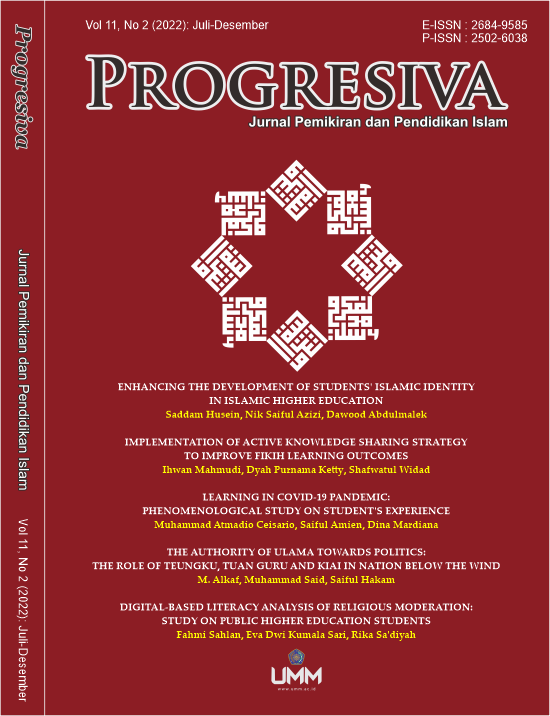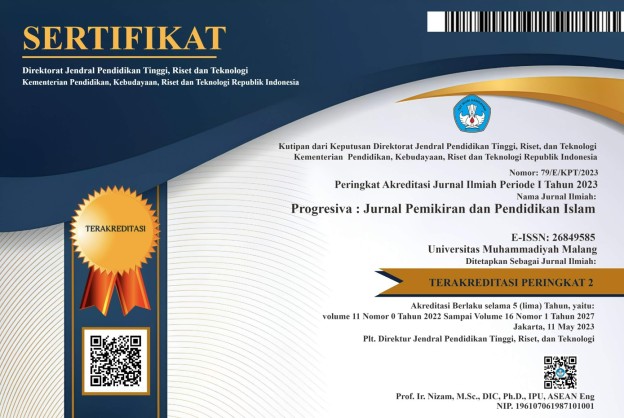The Authority of Ulama towards Politics: The Role of Teungku, Tuan Guru and Kiai in Nation Below the Wind
DOI:
https://doi.org/10.22219/progresiva.v11i02.22964Keywords:
Teungku, Tuan Guru, Kyai, Otoritas, PolitikAbstract
This article discussed the relationship between ulama and politics in three types of elite Islamic leadership in Indonesia: Teungku in Aceh, Tuan guru in Lombok, Nusa Tenggara Barat, and Kiai in Java. The research was organized based on the central questions; what was the political role of Teungku, Tuan guru, and Kiai, and what was their authority in the dynamics of local and national politics? This research used qualitative methods with an ethnographic approach. Data was collected through direct observation, interviews, review of written sources, and documentation data. This article found that Teungku, Tuan guru, and Kiai, in addition to being religious elites, also played the role of political elites. With the capital of religious authority at their disposal, they were confident to engage in practical politics. Teungku in Aceh was actively involved in redefining the narrative of the Acehnese nation by promoting the formalization of Islamic Sharia through a policy of special autonomy. With this policy, Teungku's position became more substantial and strategic politically and religiously. While in Lombok, Tuan guru became a local strongman who seized legislative and executive power in Nusa Tenggara Barat. They succeeded in seizing local power from the Sasak aristocratic circles. Meanwhile, Kiai in Java appeared to color Indonesia's discourse and political system from the beginning. Nevertheless, they managed to become part of the power in national leadership history. The relationship of the three religious elites to politics was ultimately in line with the strengthening of authority, religious traditions, and religious institutions.
Downloads
References
Abubakar, A. Y. (2020). Pelaksanaan Syariat Islam di Aceh sebagai Otonomi Khusus yang Simetris. Dinas Syariat Islam Aceh.
Aceh.tribunews.com. (2016). Tu Sop Jeunieb Pastikan Maju Sebagai Balon Bupati Bireuen.
Acehprov. (2014). MPU Sosialisasikan Fatwa Nomor 09 tahun 2014. Acehprov.Go.Id.
Aisyah, T., Subhani, & Chaidar, A. (2008). Darul Islam di Aceh: Analisis Sosial-Politik Pemberontakan Regional di Indonesia, 1953-1964. Unimal Press.
Alfian, I. (1987). Perang di Jalan Allah : Perang Aceh 1873-1912. Sinar Harapan.
Ali, F., Monoarfa, S., & Effendy, B. (2008). Kalla dan Perdamaian Aceh. Lembaga Studi dan Pengembangan Etika Usaha Indonesia.
Alkaf, M., Abdullah, I., Qodir, Z., & Jubba, H. (2022). From Islamic Modernism to Traditional Islam: The Impact of Conflict on the Shifting of Religious Authority in Aceh. Fikrah: Jurnal Ilmu Aqidah Dan Studi Keagamaan, 10(2).
Amiruddin, M. H. (2003). Ulama Dayah : Pengawal Agama Masyarakat Aceh. Nadiya Foundation.
Anthony, R. (2019). MPU: Sebenarnya Aceh tak Menolak Sosok Firanda. Tagar.Id.
Arrauf Nasution, F., Miswari, & Sabaruddin. (2019). Preserving Identity through Modernity: Dayah al-Aziziyah and Its Negotiations with Modernity in Aceh. Hayula: Indonesian Journal of Multidisciplinary Islamic Studies, 3(2).
Atjeh Watch. (2022). PAS ‘Partai Bentukan Ulama’ Aceh Utara Gelar Konsolidasi. Atjehwatch.Com.
Azra, A. (2004). Jaringan Ulama Timur Tengah dan Kepulauan Nusantara Abad XVII & XVIII : Akar Pembaruan Islam Indonesia. Kencana.
Barton, G. (2002). Abdurrahman Wahid. Muslim Democrat, Indonesian President: A view from the Inside. University of New South Wales Press.
Bush, R. (2009). Nahdlatul Ulama and the Struggle for Power within Islam and Politics in Indonesia. ISEAS.
Cresswell, J. W. (2012). Educational research: Planning, conducting, and evaluating quantitative and qualitative research (4th ed.). MA: Pearson.
Dhofier, Z. (1982). Tradisi Pesantren, Studi tentang Pandangan Hidup Kyai. LP3ES.
Fealy, G. (1998). Ulama and Politics in Indonesia: A History of Nahdlatul Ulama, 1952-1967. Monash University.
Feener, R. M. (2012). Social engineering through Sharī’a: Islamic law and state-directed da’wa in contemporary aceh. Islamic Law and Society, 19(3), 275–311. https://doi.org/10.1163/156851911X612581
Hamka. (1958). Ajahku. Widjaya.
Hefner, R. W. (2000). Civil Islam: Muslim and Democratization in Indonesia. Princeton University Press.
Isra, S. (2005). Partai Politik Lokal. Tempo.Co.
KIP Aceh. (2022). Pendatang baru, PAS Aceh menjadi Partai Lokal Kedua yang lakukan Pendaftaran Ke KIP Aceh. Kip.Acehprov.Go.Id.
Lecompte, M. D., Preissle, J., & Tesch, R. (1993). Ethnography and Qualitative Design in Educational Research (2nd ed.). Academic Press.
Lintas Nasional. (2022). Akhiri Polemik, Pemkab Bireuen Hentikan Pembangunan Mesjid Taqwa Muhammadiyah. Lintasnasional.Com.
Mabruroh. (2019). Alasan Warga Aceh Tolak Ceramah Ustaz Firanda Andirja Abidin. Republika.Co.Id.
Miswar, K. (2017). Habis Sesat Terbitlah Stres. Padebooks.
Miswar, K. (2019). Wahabi dalam Perspektif HUDA (Himpunan Ulama Dayah Aceh) dan Implikasiny terhadap Kehidupan Sosial Keagamaan di Aceh. Universitas Islam Negeri Ar Raniry Banda Aceh.
Mizaj, M. (2018). Dayah Darussalam Network and Dayah Awakening in Aceh. Budapest International Research and Critics Institute (BIRCI-Journal) : Humanities and Social Sciences, 1(3), 13–22. https://doi.org/10.33258/birci.v1i3.27
Mpuacehprov. (2014). MPU Aceh Larang Pengajian Kelompok Menyimpang. Mpu.Acehprov.Go.Id.
Nirzalin. (2011). Krisis Kewibawaan Politik Teungku di Aceh. Universitas Gajah Mada.
Nirzalin, N. (2012). Islamic Shari’a Politics and Teungku Dayah’S Political Authority Crisis in Aceh. Journal of Government and Politics, 3(2), 211–234. https://doi.org/10.18196/jgp.2012.0012
Nirzalin, N., & Febriandi, Y. (2022). ASWAJA MOBILIZATION AND INTOLERANCE: Sub-state ideology, religious vigilantism in Aceh, Indonesia. Cogent Social Sciences, 8(1). https://doi.org/10.1080/23311886.2022.2089382
Noor, M., Habib, M., & Harfin Zuhdi, M. (2014). Visi Kebangsaan Religius: Refleksi Pemikiran dan Perjuangan TGKH M Zainuddin Abdul Madjid 1904-1997 (2nd ed.). Jakarta Bania Publishing.
Nur El Ibrahimy, M. (1982). Teungku Muhammad Daud Beureueh : Peranannya dalam Pergolakan di Aceh. Gunung Agung.
Nurhasim, M. (2016). Dominasi Partai Aceh Pasca MoU Helsinki. Jurnal Penelitian Politik, 9(2), 1–15.
Prioritas. (2022). Resmi Berbadan Hukum, Ulama Kharismatik Dukung PAS Aceh. Prioritas.Co.Id.
Ramadhan, A. (2022). Besok Malam, Abu Mudi Kembali Isi Pengajian Tastafi di Masjid Raya Baiturrahman Banda Aceh Artikel ini telah tayang di SerambiNews.com dengan judul Besok Malam, Abu Mudi Kembali Isi Pengajian Tastafi di Masjid Raya Baiturrahman Banda Aceh, https://aceh.tr. Aceh.Tribunnews.Com.
Setyadi, A. (2018). Perolehan Kursi Turun, Caleg Partai Aceh Dinilai Kurang Pengaruh. Detik.Com.
Sidiq, A. (1980). Khittah Nahdliyah (2nd ed.). Percetakan Persatuan Bangil.
Sjamsuddin, N. (1990). Pemberontakan Kaum Republik: Kasus Darul Islam Aceh. Pustaka Utama Grafiti.
Sjamsuddin, N. (1999). Revolusi di Serambi Mekkah: Perjuangan Kemerdekaan dan Pertarungan Politik di Aceh 1945-1946. UI Press.
Sulaiman, M. I. (1997). Sejarah Aceh: Gugatan Terhadap Tradisi. Sinar Harapan.
Tibi, B. (2012). Islamism and Islam. Yale University Press. https://doi.org/10.5860/choice.50-2316
Van Bruinessen, M. (1994). NU: Tradisi, Relasi-Relasi Kuasa, Pencarian Wacana Baru. LKiS.
Wahid, A., & Fauzi Nasrullah, A. (1995). ICMI: Antara Status Quo dan Demokratisasi. Mizan.
Zuhri, S. (1974). Guruku Orang-Orang dari Pesantren, Bandung. PT al-Ma’arif.
Downloads
Published
How to Cite
Issue
Section
License
Copyright (c) 2022 M. Alkaf, Muhammad Said, Saiful Hakam

This work is licensed under a Creative Commons Attribution-ShareAlike 4.0 International License.


















